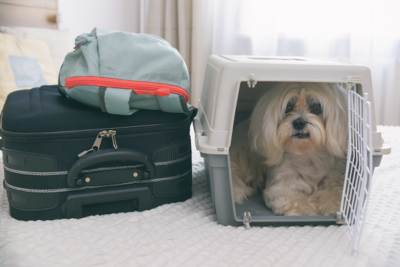
Did you know that May 9 is National Animal Disaster Preparedness Day? As this year’s wildfire prediction is higher than last year for many parts of North America, it’s essential for pet owners to have a plan in place to ensure the safety of their furry companions. Evacuating with pets can be stressful, but with proper preparation, you can help keep your pets safe and secure. Here are some essential tips to help you prepare for evacuation during wildfires.
1. Create a Pet Evacuation Kit
Pack a supply of food, water, medications, and any necessary medical records for your pets, so they’re ready to go if you need them. Include comfort items such as blankets, toys, and a familiar bed to help reduce stress. And don’t forget to pack leashes, harnesses, and carriers to safely transport your pets.
2. Make Sure Your Pets are Microchipped
Ensure your pets are microchipped and that their microchip information is up to date. Keep a current photo of your pets with you, along with their microchip numbers, in case you become separated during evacuation.
3. Know Your Evacuation Routes
Familiarize yourself with evacuation routes in your area and create a plan for how you will evacuate with your pets. Keep a list of pet-friendly hotels or shelters along your evacuation route.
4. Stay Informed
Monitor local news and weather reports for updates on wildfire activity in your area. Sign up for emergency alerts and notifications to stay informed of evacuation orders and other important information.
5. Practice Evacuating with Your Pets
Conduct practice evacuations with your pets to help them become familiar with the process. Use treats and positive reinforcement to help reduce stress and anxiety during practice evacuations.
6. Have a Plan for Large Animals
If you have large animals, such as horses or livestock, make sure you have a plan for their evacuation, as well. Identify alternative housing options for large animals in case of evacuation.
7. Stay Calm and Be Prepared
During an evacuation, remain calm and focused on safely evacuating yourself and your pets. Follow evacuation orders and instructions from emergency personnel.
By following these tips and being prepared, you can help ensure the safety and well-being of your pets during wildfire season. Remember, early preparation is key to keeping your pets safe and secure during an emergency evacuation. Stay informed, stay prepared, and stay safe!
